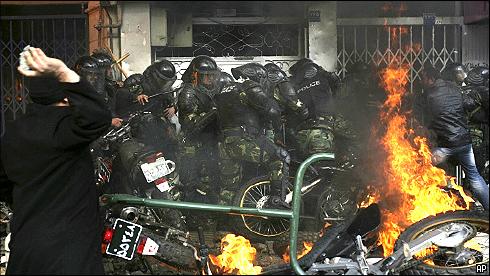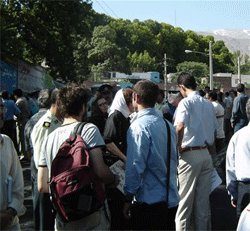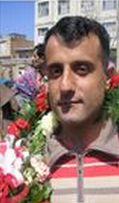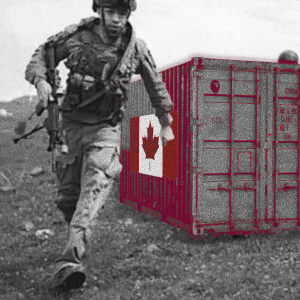A translation of an article from issue # 52 of Khiaban newspaper.
There is also a translation of another highly recommended article from the same issue of Khiaban on Revolutionary Road; that article discusses the sources of homophobia in the Iranian regime's ideology.
You can read all previous issues of Khiaban newspaper here.A Closer Look at the Nature and Destination of People's Movementby Amir K.
Khiaban # 52 / Thursday, November 5, 2009More than five months have passed since Khamenei-Ahmadinejad's electoral coup; also five months since the start of the people's movement against the existing situation. Despite the unprecedented killings of the dissidents, despite the imposition of an undeclared martial law on the country, the arrests of thousands of people, suppression of the media, chasing and harassing all social and political activists - in short, despite deploying all the tools of state oppression, the regime has not been able to crush the people's movement. On the other hand, the participation of millions of people in the opposition movement, countless innovations from below, the sacrifices and the amazing persistence of ordinary citizens, and despite the activation of a major part of social capacities for confronting the dictatorship, the movement has still not been able to bring about any tangible results in bringing down the dictatorship and in bringing about a people's governance.
To answer the question, "What is to be done?" it is necessary to start with an analysis of the concrete current situation.
The CoupThe flame of the current struggle of the people was sparked in reaction to the electoral coup in June. In un-free elections held in the absence of freedom of political parties, lack of freedom of speech and lack of the right of assembly for those outside the regime (i.e.; lack of rights for those not belonging to the regime), a huge segment of the society entered the electoral arena to prevent the re-election of Ahmadinejad and, through voting for two reformist candidates inside the regime, to bring a slight ray of hope upon theirs abject social, cultural and economic misery. However, Ahmadinejad, who sits atop the military-economic bloc, by using his powers within the system, by relying on the Sepah [Revolutionary Guards] and the Basij, and by gaining the backing of Khamenei, the leader of Islamic Republic, did not abide by the results of the elections and with an utter shamelessness that is familiar to the Iranian people, announced himself the winner with 63% of the votes. Then, he answered the millions-strong protests in the streets with bullets and further limiting the media, misinformation, suppression of political activists, mass killing of street protesters, torture and rape of the detained demonstrators, etc., in an attempt to impose yet another grave-like silence upon the society. The fact that the people's movement took to the streets in reaction to an electoral coup inadvertently means it also had some connection to the electoral campaigns of the candidates. We cannot claim that all the anger and the rage of the people is on account of their support for Moussavi, nor can we claim that there is no relation at all between the people and the electoral campaigns of that segment of the regime that has come under attack.
Reformists' Strategic MistakesWe cannot see Ahmadinejad's electoral coup and close our eyes to the fatal mistakes of reformism. Although reformism guarantees only the interests of a segment of the ruling class, regime's reformists have tried to present their discourse as possessing historical legitimacy and not class-based. The reformists consider their ideas and strategies as having arisen from historical experiences and as the intellectual achievement of the contemporary world. It is interesting that even after the Ahmadinejad coup, the reformists have taken the offensive and, for example, they can be heard saying, "This movement belongs to us, and the people and positions that voted for the boycott of the elections have no right to participate in this movement." Until now, they have been running away from any social accountability, especially regarding their strategic mistakes which have led to the current situation, and they are still propagating their pre-coup illusions.
The reality, however, is that, what we can perhaps call an Iranian reformism is a collection of thoughts and ideas that are brimming with dogmas and ossifications that have rendered reformism blind in the face of complicated and dynamic social realities. One of the most important of these dogmas is limiting political activities to ballots and voting. Reformism has always defined politics as the ballot-driven competition. But even there, they have never been consistent defenders of the right of other political and social forces to take part in elections, and even during the period when they themselves held the government and the parliament, political parties or organizations critical or opposed to them were not allowed to be socially present in free and fair elections. But their speechifying and playing with words has no limits. The reformists have always defined themselves by distinguishing themselves from radical historical politics. In their view, Che Guevara and Fidel Castro should have defeated Batista in an electoral fight, but since they chose a different way, they brought about the death of numerous people, and the result has been a country that, in reformists' estimation, is more backward and undemocratic compared to the U.S. (have you ever heard Cuba compared to, say, Guatemala?). Or else, their vast campaign in numerous media against Hamid Ashraf and the Fedayeen-e Khalq guerrillas tries to show that armed struggle in the 1960s and 70s was insufficient, anti-humanistic, anti-democratic and anti-social and the internal logic of that form of struggle has led to the threat against social freedoms in the aftermath of the 1978-79 revolution. (It is not clear at all why Khomeini's form of struggle, which was a combination of western media coverage, over-excessive deception, tendency toward rule by committee, as opposed to mass organizations, and on and on, had no impact nor any influence on the shape and structures of this dictatorship, and all kinds of other why's can be found for it!).
This dogma of reformism as relates to the ballot box was an important factor in the rise of fascism in Iran. While a definite military-economic mafia was busy gobbling up the most important sources of wealth and power in the country, for the reformists the only way of fighting against this was seen as the ballot box. While social movements such as the students and workers movements had understood the necessity of fighting fascism in the streets, the reformists, faced with the mass killing of students in 2007 and the workers on the May Day [this year], remained passive observers (and of course happy to see the elimination of radical forces, who could truly bring a fundamental challenge to the reformist discourse as well as to the material interests of the capitalist classes in Iran). However, the reformists remained blind to the reality that Ahmadinejad's fascism no longer needed to play along with the charade of the ballot box. In fact, in any country where fascism has come to power, it has done so through the ballot box (just like the 2005 elections in Iran), but it has never allowed the possibility of being voted out. Reading contemporary history is not difficult but reformist intelligentsia reads only its favorite paragraphs and memorizes those.
Why must the coup be defeated?Some believe, from a liberal position, that the term 'coup' is meaningless here. Islamic Republic has always been a coup regime, in which people have never had a real role in any of the elections. This regime uses the people only to put a stamp of legitimacy on its own selections. Others too, from a socialist position, believe that the political system in Iran is a capitalist one, and remained the same before and after the 2009 elections, from the point of view of workers and the productive classes. They believe that the term 'coup' is merely the propaganda of the regime's reformists, who are being eliminated from the political and economic control of the society, and in this way are trying to involve the whole society in a fight that's only to their own benefit. Each of these arguments illustrates some realities of social life under the domination of Islamic Republic. But neither considers the reality in its complex totality. Hitler's Germany was a capitalist country. The Weimar Republic was also capitalist. Different political formations, all of which can be classified as capitalist, have different direct impacts on the society and the dominated classes in the society. In 1981, Khomeini and the Islamic Republican Party organized a political coup to eliminate Banisadr; this, however, was a coup that was internal to the ruling structure. Banisadr was not the representative of the workers and the productive forces in the society. He was a hotheaded supporter of Islamic rule (from his own view) and had an active role in the suppression of progressive movements in Kurdistan and other regions in Iran. However, this coup had a fatal impact on the whole society, and on socialist and communist social political movements.
The current coup, too, in the event of its consolidation and victory, will not merely lead to the elimination of a part of the ruling class. Ahmadinejad, who just like Khomeini, has no fear of mass slaughter of dissident people, will shape another murderous era in the Iranian contemporary history. The total destruction of social life, extreme exploitation by a ruling class that has become excessively militarized and claims to be God's representative on earth, widespread purges in the universities and places of work, mobilization of collective resources for private gain, and on and on, may not have an impact on a theoretician sitting in a safe corner far away, but it will have a direct impact on the majority of people and their daily lives. People who have entered the arena to defeat the coup and are organizing themselves have real and earthly interests in preventing this dark era, whose impact will include [down to even] their choice of clothing, to their social relations, to their income and benefits, to their right of speech, right of education, right to work even and numerous other matters. The very recent actions [by the government] show us the future horizon. The transfer of social resources to companies under the control of the Sepah [Revolutionary Guards] (in reality, under the control of the power to shoot at people, and also the sources of wealth in the hands of a limited echelon of the powerful), the assault on science and university, widespread suspension of the right to education [of dissident students], numerous prisons for social activists, further suppression of media, deepening of spying in the most private spheres, assuming absolutist powers by the state, widespread tracking down of social activists even in Europe countries and ...
Yes, the eliminated faction of the ruling system is definitely seeking to channel this movement into its own material interests. Even the U.S and numerous other world powers are seeking their material interests and are looking to benefit from this movement for their own gain. However, it is irresponsible to use these facts as excuses to close our eyes on the abject and widespread misery that the coup regime will bring to the people. In the same way that imperialism or the different factions of the regime will not take a holiday in the pursuit of their material interests, the people too struggle for their future and social life. The laboring forces of social production will not exit this fight since their life and future do not allow for such a choice. What is necessary is an all-encompassing political fight against the forces that aim to channel all these struggles and sacrifices into their own corrupt, minority interests. Displaying delight at the defeat of the people against the coup shows the historical stupidity of these political forces. When Franco emerged victorious from the Spanish Civil War, he continued his dictatorship for four decades. Hitler and Mussolini did not lose power but as a result of a world war, and the intervention of foreign forces. Anybody who is concerned about the society cannot pull him/herself out of this arena. Especially when the fight against the coup is not an attempt at restoring an Islamic Republic.
The Coup and the Islamic Republic There is no doubt that, for those who used to belong to the minority benefiting from the Islamic Republic, returning to the good old days is an intense wish and desire. The defenders of returning to the previous Islamic Republic, which certainly include Moussavi, base their main argument on the idea that this recent electoral coup, by turning its back on the people's vote, has turned the Islamic Republic into an Islamic Regime. Consequently, defeating the coup means returning to the Islamic Republic and this movement is a movement for Islamic Republic; nothing more and nothing less.
Such a view may hold true for some coup's; for example, a coup in which an armed group militarily captures the parliament and the presidential palace and suspends the constitution and establishes a new government. In this situation, fighting against the coup means fighting to restore the government and the legal system that existed before the coup. But the current reality in Iran is something else. Ahmadinejad's electoral coup does not follow such a model. All the legal institutions of the Islamic Republic have sanctioned his fraud, and he enjoys the support of the parliament, the judiciary and also the supreme leader. All the crimes that he has committed are based on the contradictions that exist in the constitution of the Islamic Republic. Isn't torture forbidden? Of course it is. But suspension [of law] is allowed. Were not the people's assemblies to protest the election results legal and their military suppression illegal? Of course not. Assembling and protesting are allowed unless they interfere with Islamic principles, and the law has deputized certain institutions to look into such matters, and all those legal institutions (not I or you) believe that such gathering interfere with Islamic principles. Ahmadinejad has not carried out a coup against a ruling system, but has used the system's capabilities to his own benefit and that of the group he represents. In fact, this is a corrupt, class-based, anti-human system, which is reliant on expropriating the people's right of self-determination and on putting this right in the hands of 'God's representatives', a system based on class oppression, ethnic oppression, the oppression of the capital city against the provinces, and gender and sexual oppression. As a result, people are not fighting the coup or the dictatorship in order to restore the system that existed prior to June 12. Even the motivation of a huge segment of the people in participating in those elections was based on wanting change, which itself was based on a mistaken idea that such a change could be pursued from within the capabilities of the existing political system (Islamic Republic). The people who have brought to this movement all their cleverness and innovations in order to overthrow Ahmadinejad's coup, do not share those dreams, such as spun by the Moussavi's, of returning to some Islamic Republic. It is true that in that [former] Islamic Republic Moussavi was the prime minister, Karroubi was the parliamentary speaker, Khatami was the president, Sane'ee the attorney general and numerous others of this circle were among the rulers, but the people, the ordinary citizens who are carrying the struggle forward, in that very Islamic Republic, were threatened, were exploited, insulted, imprisoned, their voices suppressed, their organizations not allowed to be active, and on and on ...
A Mass and Pluralist MovementSince fascism assaults the entirety of the society, the response to it too is all encompassing. In the current movement in Iran nearly all social classes have been mobilized. Some try to define this movement as a movement of the middle class of Tehran. Their most significant evidence is that most of the people's protests take place in Tehran and in areas to the north of Azadi St. and Enghelaab St. Those who defend this line of thinking have particular political objectives for this observation of theirs. They are attempting to define the movement in their own image: a middle class that, under the leadership of the regime's reformists, wants a mild opening in the country's political space, and would like to have some guarantees from the regime regarding making a living and accumulating wealth, and being able to open up shop and get rich through the work of others - but of course, to their own mind, through their own good education and cleverness - and driving a nice car, reading the reformist newspapers, and enjoying Tahmineh Milani and Mohsen Makhmalbaaf films.
In this image, the working class monster is completely missing from the picture. The fight is merely between this particular [middle] class and a coalition of uneducated provincials, shantytown dwellers, religiously minded country folk and fat revolutionary guards, whose political representative is Ahmadinejad. Proponents of this line of thought are passionate supporters of capitalism, who, in a disappointing manner, are not capable of understanding the necessities of capitalism in Iran. They have their eyes on some utopia that can be brought about by a more modern cleric like Khatami and a suited engineer with such magnificent manners as Moussavi, who will take hold of the wheels navigating the Iranian capitalist state with the aid of the western states, and who will create a Las Vegas on the shores of the Persian Gulf and a Europe on the slopes of the Alborz Moutain.
The problem for these educated fanatics of capitalism is that they replace reality with their own dreams and fantasies. The increasing militarization of the society is not a consequence of the rush by the Basijis from Shahr-e Ray to Vanak. The militarization of the society and the increasing suffocation springs from the necessities of capitalist development in societies like Iran. Neoliberalism means 'deregulation'. Why? Because regulations and laws get in the way of capital accumulation. 'Law', 'Freedom of speech and organization', 'people's intervention in determining their own fate' for a capitalist - which, in order to remain in the global competition, needs increasing exploitation of the labor force - can only lead to eventual death. The real solution for capitalism and the bazaar (market) in Iran is Ahmadinejad. The similarities between the behavior and the workings [of state] in Iran and those of China and Russia have their roots in that reality.
Some - by showing that there supposedly existed a communist tendency in the Islamic Republic that has become more apparent with Ahmadinejad, and by pointing to the communist history in Russia and the current claims to communism by China - have tried to connect the similarities between the three countries, in violating human rights and freedom of speech, to communism; in contradistinction to the liberalism of western Europeans and of the reformists. But it will suffice to think a little deeper to see that capitalism and the market have been ruling China and Russia for years, and it is exactly the tendency in these countries for remaining and competing on the global scene that is necessitating a murderous political structure to dominate those countries. Iran, for its capitalistic survival, needs 'lack of laws', 'deregulation', oppression and Sepah, if it wants to remain a regional power. The other capitalist alternative is the equivalent of an absolute disintegration of Iran as a society, and the formation of fiefdoms of opened up spaces for the looting of the global capitalism.
However, if we step away from the illusory images of these intellectuals of the Iranian middle class, a more realistic knowledge and understanding of the current movement can be gained. Fascism is the assault against the entire life and the world of social existence. Consequently, all the layers of society react to it. The resistance against fascism will always involve different parts of the society, from layers in upper classes, to office workers, to the youth, the working classes, rural populations, the unemployed, the retired and ... A look at the class base of those killed in the course of the street protests will prove this reality as evident: Men and women, from the youth who has come to Tehran from Lorestan villages to do manual labor to the factory worker, the engineer, university student, student of philosophy, high school students, the middle aged. The higher level of mobilization in Tehran, and particular areas of it too can be explained very easily. The current phase in the fight against the dictatorship is a non-violent movement that seeks to pursue its political demands through street protests. In small cities and towns, the possibility of presence in overt demonstrations can lead directly to being identified. Tehran, however, is a mega-city and the 'anonymity' of people is a particular characteristic of big cities. Identification of the protesters, especially in huge demonstrations, is virtually impossible; in particular, in areas that do not have a traditional or neighborhood-like structure. Therefore, the more modern areas of Tehran become the places of gathering for the entirety of society.
In the next installment of this article, issues of leadership, relation between fighting for freedom and fighting for social equality (socialism), and the issue of alternatives to the Islamic Republic will be discussed.
 From In Defense of Marxism.
From In Defense of Marxism.




















